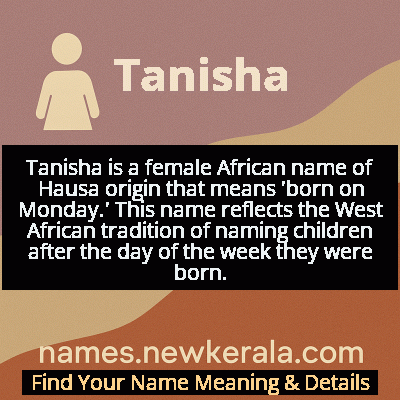Tanisha Name Meaning & Details
Origin, Popularity, Numerology Analysis & Name Meaning of Tanisha
Discover the origin, meaning, and cultural significance of the name TANISHA. Delve into its historical roots and explore the lasting impact it has had on communities and traditions.
Name
Tanisha
Gender
Female
Origin
African
Lucky Number
9
Meaning of the Name - Tanisha
Tanisha is a female African name of Hausa origin that means 'born on Monday.' This name reflects the West African tradition of naming children after the day of the week they were born.
Tanisha - Complete Numerology Analysis
Your Numerology Number
Based on Pythagorean Numerology System
Ruling Planet
Mars
Positive Nature
Generous, passionate, energetic, and humanitarian.
Negative Traits
Impulsive, impatient, moody, and can be overly emotional.
Lucky Colours
Red, maroon, scarlet.
Lucky Days
Tuesday.
Lucky Stones
Red coral, garnet.
Harmony Numbers
1, 2, 3, 6.
Best Suited Professions
Military, sports, philanthropy, leadership roles.
What People Like About You
Courage, energy, leadership, generosity.
Famous People Named Tanisha
Tanisha Thomas
Television Personality
Gained fame on Bad Girls Club and built successful media career
Tanisha Crasto
Badminton Player
International badminton player representing India and UAE
Tanisha Mukherjee
Actress
Bollywood actress known for multiple film roles
Tanisha Brito
Model and Actress
American model and television actress
Name Variations & International Equivalents
Click on blue names to explore their detailed meanings. Gray names with will be available soon.
Cultural & Historical Significance
In Hausa culture, Monday-born children are believed to possess specific characteristics and the name Tanisha helps establish this identity from birth. The practice of day-based naming extends beyond the Hausa to other ethnic groups in the region, creating a shared cultural framework. This tradition has been maintained through generations and continues to be an important aspect of cultural preservation among African diaspora communities worldwide.
The name's journey from West Africa to global usage represents the broader story of African cultural resilience and adaptation. During the era of the Atlantic slave trade and subsequent migrations, many African naming traditions were suppressed or lost. The revival and adaptation of names like Tanisha in the 20th century represents a conscious effort to reclaim cultural heritage and maintain connections to African roots despite historical displacement.
Extended Personality Analysis
Individuals named Tanisha are often described as possessing strong leadership qualities combined with a nurturing spirit. They tend to be determined and ambitious, approaching challenges with Monday's symbolic energy of new beginnings and fresh starts. Their personality often reflects a balance of practicality and creativity, making them effective problem-solvers who can adapt to various situations while maintaining their core values.
Tanishas are typically known for their loyalty and strong family connections, often serving as the emotional anchor in their relationships. They exhibit natural charisma and social intelligence, allowing them to build diverse networks of friends and associates. Many Tanishas demonstrate resilience and the ability to overcome obstacles, embodying the Monday-born association with renewal and perseverance.
In social settings, Tanishas often display warmth and approachability that makes others feel comfortable. They tend to be good listeners and offer practical advice when needed. Their Monday-born association suggests they may have a natural rhythm of working hard during the week while valuing rest and reflection, creating a balanced approach to life's demands. This combination of strength and sensitivity makes them valued members of their communities and reliable partners in both personal and professional relationships.
Modern Usage & Popularity
Tanisha gained significant popularity in the United States during the 1970s and 1980s, particularly within African-American communities seeking to reconnect with African cultural roots during the Black Pride movement. The name peaked in usage around the 1990s and has since maintained moderate but consistent popularity. In contemporary times, Tanisha remains a recognizable and respected name that bridges African heritage with modern Western naming conventions. It continues to be chosen by parents who value cultural significance while wanting a name that functions well in multicultural societies. The name's usage has spread beyond African-American communities to become appreciated by diverse ethnic groups who admire its melodic sound and meaningful origin. While not currently among the most popular baby names, Tanisha maintains a steady presence and continues to be chosen by parents seeking a name with cultural depth and modern appeal.
Symbolic & Spiritual Meanings
Symbolically, Tanisha represents new beginnings, fresh starts, and the cyclical nature of time and life. As a Monday-born name, it carries associations with the moon's energy, intuition, and emotional depth. The name embodies the concept of renewal and the opportunity to begin again, much like each new week starting on Monday. In many cultural interpretations, Monday-born individuals are thought to possess calming energies and the ability to bring peace to challenging situations.
Tanisha also symbolizes cultural continuity and the preservation of tradition across generations and geographic boundaries. The name serves as a living connection to African heritage and represents the resilience of cultural practices despite historical disruptions. It stands as a testament to the importance of maintaining identity while adapting to new environments, making it particularly significant for diaspora communities seeking to honor their roots while building new lives. The name carries the symbolic weight of cultural reclamation and the ongoing process of connecting present identities with ancestral traditions.

